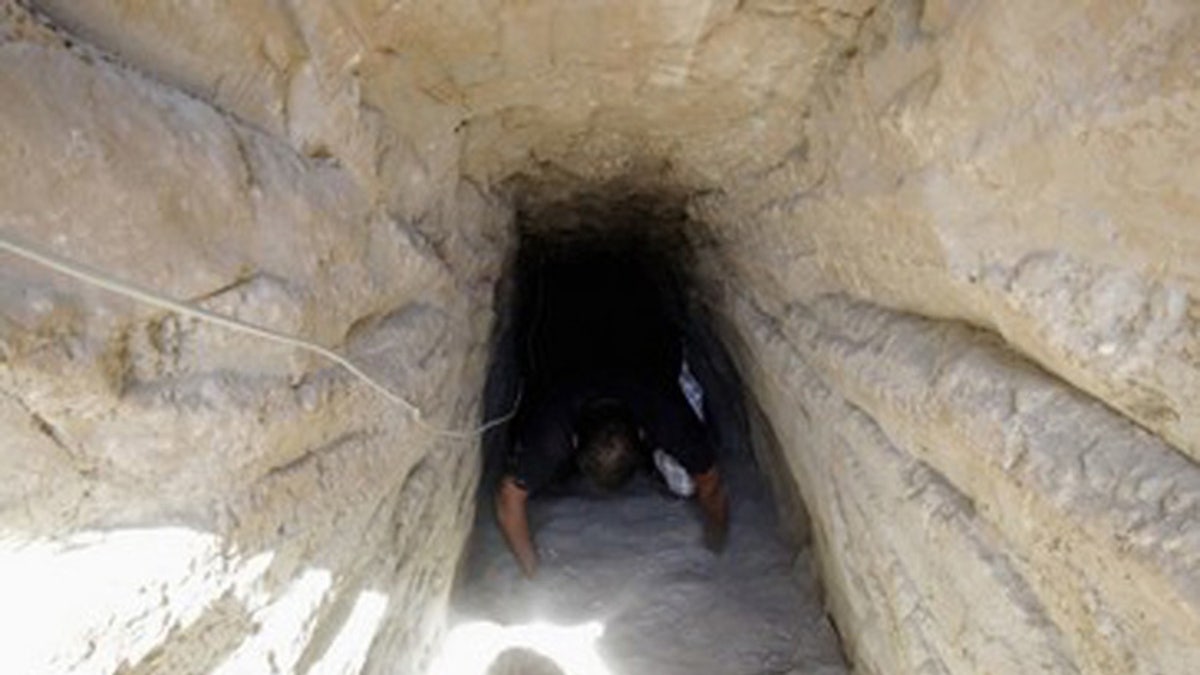
As Egypt begins sealing smuggling tunnels after the Sinai attack which killed 30 soldiers. (Reuters)
Critics who think Israel is taking a heavy-handed approach in destroying Hamas terror tunnels should see what Egypt has in mind.
Facing the same type of underground routes out of Gaza that allowed terrorists to mount attacks on Israel, Egypt is considering creating a huge, 1,000-meter buffer zone in the Sinai Peninsula – they have already evicted 10,000 people in the process of clearing the first 500 meters -- and digging a deep-water trench that would flood any future efforts to carve subterranean routes for smuggling weapons and terrorists in and out of Gaza. And unlike the fierce resistance and international public relations campaign Hamas mounted against Israel in August, the terrorist group that governs Gaza appears to not be seeking a head-on fight with Cairo.
“I don’t think that Hamas is looking for a confrontation with Egypt,” Zvi Mazel, Israel’s ambassador to Egypt from 1996–2001, told FoxNews.com. “They don’t want to put more oil on the fire. After all, Hamas stems from the Muslim Brotherhood -- and the presence of the Brotherhood is nowhere in the fight now -- so Hamas doesn’t want to speak too loud.”
[pullquote]
Perhaps not a full-scale confrontation, but constant attacks on Egyptian civilians and soldiers by Sinai-based terrorists allegedly working closely with Hamas, including a Tuesday night mortar attack that killed 10 Egyptians, and an attack last month that killed 30 Egyptian soldiers, appear to have pushed Egyptian President Abdel Fattah el-Sisi to the brink.
The maze of tunnels that have long run between the southern Gaza Strip and northern Sinai flourished during the time of Mohammed Morsi, Egypt’s former Muslim Brotherhood president, and helped supply Gaza with the thousands of missiles and other arms used against Israel this summer in the vicious 50-day war. Morsi was ousted last year by el-Sisi -- formerly head of the armed forces -- who has driven the Muslim Brotherhood from Egypt, outlawed the organization, and gone after other radical Islamist groups.
[image]
The devastating attack on the Egyptian soldiers, which took place last month near the Rafah crossing between Gaza and Egypt, was likely carried out by the jihadist group Ansar Beit al-Maqdis with critical support from Gaza. Before and since that devastating operation, Egyptian forces have been involved in fierce clashes with the Sinai terrorists, attempting to clamp down on their supply lines and infrastructure.
Following the loss of so many men, Egypt indefinitely closed the key Rafah crossing into Gaza and announced that it would establish a 500-meter buffer zone on its side of the Rafah border. The plan included the trench as well as blanket surveillance of a no-man’s land that would be created by the eviction of more than 10,000 people from their homes and the complete clearing of the land. But when tunnels leading out of Gaza and extending in excess of 800 meters into Egyptian territory were discovered in recent days, Cairo began considering doubling the size of the buffer zone.
[image]
“Egypt has not yet taken the decision because it’s a very difficult measure -- another 500 meters with many people living there -- but they are studying the problem and they’ll make a decision in the coming days,” Mazel said.
Ansar Beit al-Maqdis, which Mazel noted recently pledged its loyalty to Islamic State, has on a number of occasions beheaded its victims, too. Its links with Hamas, which is suspected of funneling it funds, men and weapons, and its unbridled violence, have made it a key target of Cairo.
Although Hamas will be hard-pressed to fight back against Cairo or win the kind of international sympathy it saw even as it rained rockets down on Israel, Amnesty International has condemned the plans for a buffer zone.
“These are all shortcuts,” Amnesy's Salil Shetty told Reuters. “You are not able to address the underlying issue, which is what is happening in the Gaza Strip and how the Muslim Brotherhood and other opposition are being treated. You can create fortresses and buffer zones but it will come back to bite.”
